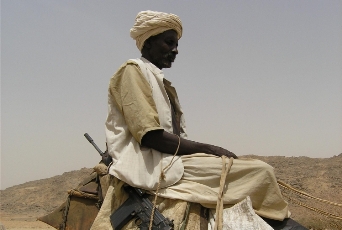Conflict simmers in East Sudan over failure to implement peace plan: ICG
November 26, 2013 (KHARTOUM) – East Sudan could be the scene of further conflict, as grievances over the perceived failure to implement a 2006 peace agreement remain widespread, a think-tank group has warned.

The ICG blamed the current situation on the failure to implement provisions in the East Sudan Peace Agreement (ESPA), as well as the “divide-and-rule tactics” pursued by the ruling National Congress Party (NCP) in Khartoum.
“The failure to implement the ESPA, together with NCP machinations, has hopelessly divided – mostly along tribal lines – the Eastern Front (EF), the alliance of armed groups that signed the agreement”, ICG said.
The ICG the NCP had sought to maintain its dominance by buying off tribal leaders, establishing tribal militias and boosting support to Arab tribes in the area.
Under government protection, members of the Rashayda tribe have settled in Beja territory, namely in predominantly Beni Amer localities such as Khasm al-Gerbah in Kassala state, and Tokar, Al-Ganab and Al-Awlaib in Red Sea state. In early 2012, the Beni Amer came close to clashing with the Rashayda, who had begun artisanal gold mining in South Tokar. The situation was calmed only after the intervention of elders from both tribes, although tensions remain high and could easily escalate if security deteriorates in the region, the report outlined.
The ICG said tribal leaders see this as a deliberate attempt by the NCP to Arabize the east, similar to the methods used in Darfur in the years leading up to the conflict.
It also cautioned that secessionist tendencies and attitudes are on the rise in Sudan’s eastern region due to the widespread view that Khartoum is exploiting the region’s resources for its own gains.
The ICG quoted an eastern Sudanese leader as saying that he believes “in unity not separation”, but is “unable to convince the people that separation is not good for them, simply because they are fed up with Khartoum”.
In September 2012, activists calling for separation distributed a statement in Port Sudan, announcing the establishment of the Democratic Revolutionary Front for Eastern Sudan’s Liberation. They called for separation from Khartoum and creation of the Democratic Republic of Eastern Sudan.
ICG noted that several eastern factions are now calling for the toppling of the NCP-led regime, with a number also joining the rebel coalition group known as the Sudan Revolutionary Front (SRF) which is fighting Khartoum in Darfur, Blue Nile and South Kordofan.
Last February, EF members issued a statement giving the central government one month to follow through on their commitments, particularly the financial portion.
Under the October 2006 peace agreement, the EF joined with the government, with $600 million provided under the East Reconstruction and Development Fund (ERDF) to help the region recover from war.
A further $3.5 billion pledged at a donor conference that took place in Kuwait in December 2010 was also supposed to be added to the ERDF.
However, the EF said the money is managed inappropriately and without transparency, claiming the people of the East were have been deliberately excluded from the top posts at ERDF or given positions without a mandate.
According to the United Nations Development Programme (UNDP), Eastern Sudan has the country’s highest poverty rate; the highest number of deaths of children aged under five, and the most children between the ages of six and 13 out of school.
Sudan’s eastern Red Sea, Kassala and Gedaref states have potential gold, oil and gas resources, but poverty remains endemic among the region’s five million inhabitants, whose livelihoods have been undermined by war, climate change and environmental degradation.
The ICG noted the ESPA had attracted criticism on the ground from the start, and is largely viewed as a continuation of the piecemeal approach in tackling Sudan’s crises.
According to the ICG, “the ESPA was clearly a sub-national deal”, but – pushed by Eritrea – it was “the best deal available” at the time.
Major provisions in the ESPA were not implemented as promised, the think-tank group said. These include the allocation of legislative and executive positions to the EF in federal and state institutions, the establishment of the ERDF, as well as disarmament, demobilisation and reintegration (DDR) of EF forces.
The ICG underscored the important role played by Eritrea in helping keep the peace agreement intact. The Red Sea nation fears the conflict in East Sudan could spread across its borders, “an area where Eritrean Islamist armed groups have historically operated and which continues to be a top security concern for the government [in Asmara]”.
The Eritrean president, Isaias Afewerki, is currently on a visit to East Sudan to inaugurate the Red Sea’s seventh festival for tourism and shopping.
His Sudanese counterpart, Omer Hassan al-Bashir, took the opportunity to accuse unspecified nations of seeking to undermine relations between the two countries, stressing that the tensions prevalent in the 1990s are the past.
(ST)
